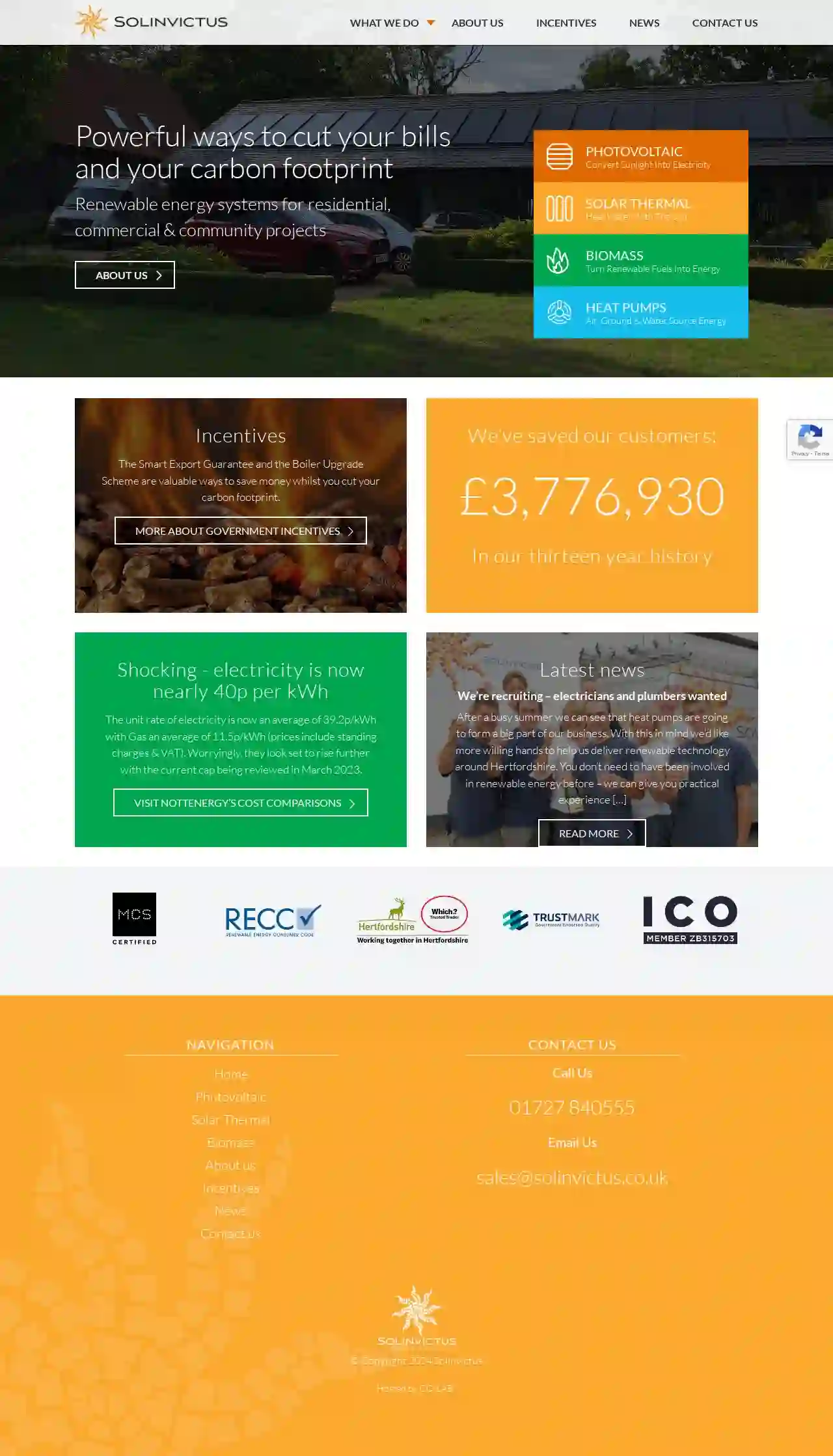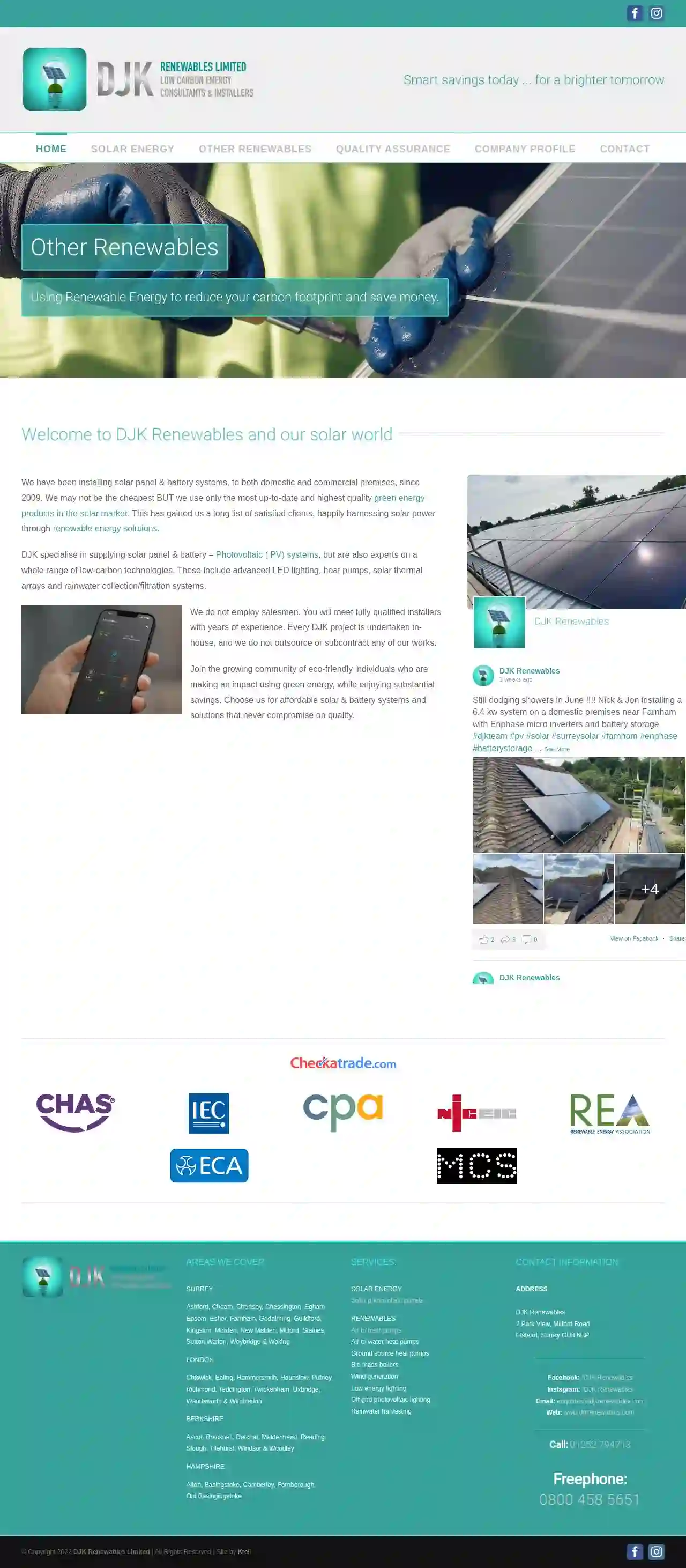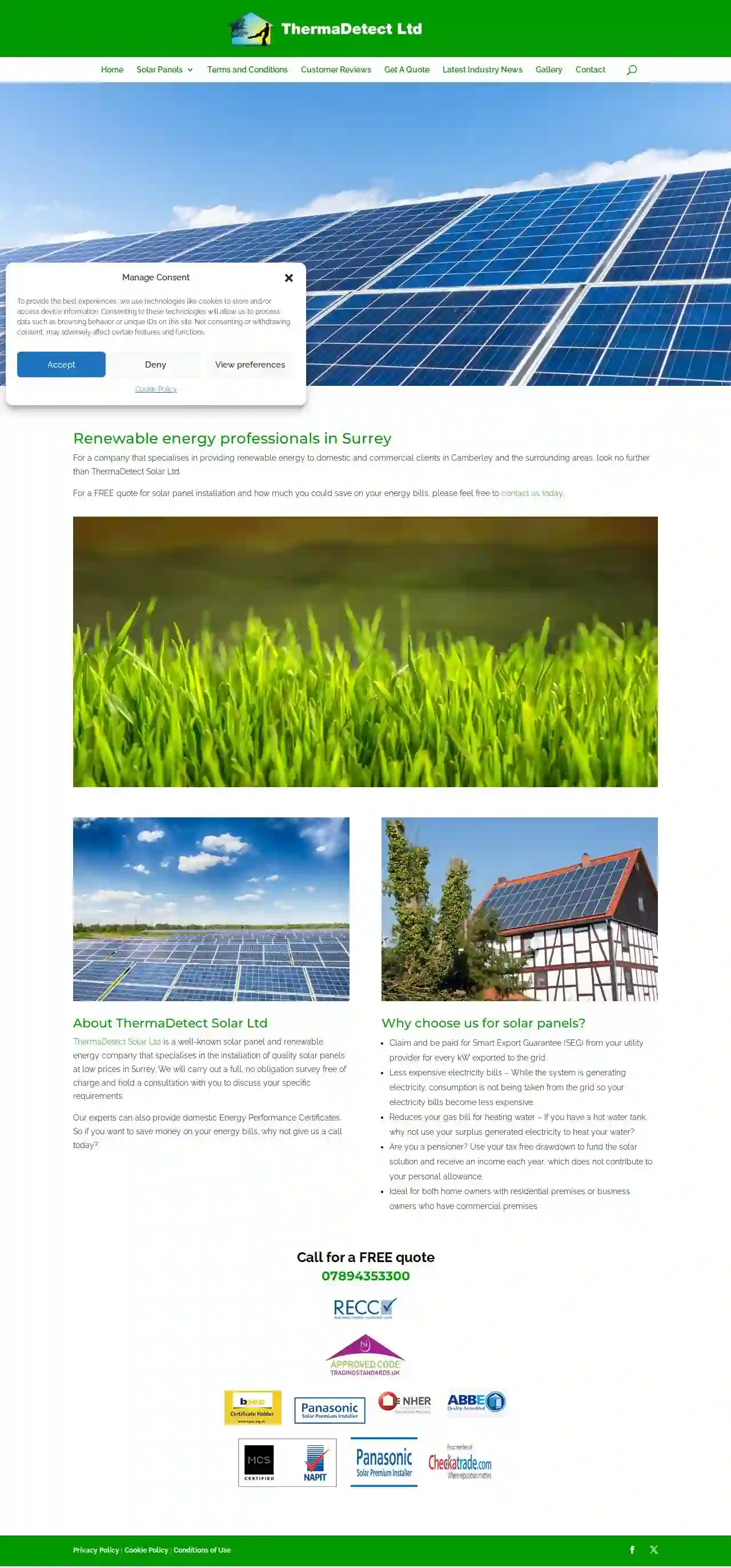Solar Installers Thames Ditton
Find top Solar Installation Company in Thames Ditton
Get 3 FREE Solar Installers quotes for your project today! Compare profiles, reviews, accreditations, portfolio, etc... and choose the best deal.

Solinvictus
4.414 reviewsEwell, GBSolinvictus is a renewable energy company based in Hertfordshire, UK, with over thirteen years of experience in providing sustainable solutions for residential, commercial, and community projects. They specialize in a range of renewable energy systems, including photovoltaic (solar electric), solar thermal, biomass, and heat pumps. The company is committed to helping customers reduce their energy bills and carbon footprint. They highlight the significant cost savings their customers have achieved, totaling £3,776,930 over their history. They also emphasize the rising cost of electricity, currently averaging 39.2p/kWh, and encourage customers to explore government incentives like the Smart Export Guarantee and the Boiler Upgrade Scheme to make renewable energy more affordable. Solinvictus is actively expanding its team and seeking electricians and plumbers to join their mission in delivering renewable technology throughout Hertfordshire.
- Services
- Why Us?
- Gallery
Get Quote
Sphere Energy Solutions Ltd
520 reviewsGuildford, GBSphere Energy Solutions are a family run business based in Bagshot, Surrey. Established in 2010 we have a vast amount of experience in the electrical and renewable energy sector. Our team of fully qualified domestic, commercial and industrial electricians, who specialise in renewable energy and low-energy electrical systems. We offer a broad range of services to clients in and around Surrey, Berkshire, Hampshire and Greater London. Whether we are carrying out a residential rewire or working as solar panel installers in Surrey on expansive commercial premises, we bring the same high standard of workmanship and customer service wherever we go. Our aim is to help you update and improve your property’s electrical infrastructure, whether it’s because you are currently experiencing difficulties, want to save on your monthly bills, reduce your carbon footprint or safeguard your property against an electrical accident. If you have ever considered having solar panels installed on your property or investing in an electric vehicle then we can be of assistance. Our expert solar PV panel installers can advise you on the type of panels that will best suit your needs, reducing or altogether eliminating your energy bill, all the while making your household or place of work that much more environmentally responsible. Our prices are competitive, and we are happy to offer free no-obligation estimates to all prospective clients. We urge you to look at our Testimonials page to hear from our previous customers.
- Services
- Why Us?
- Accreditations
- Gallery
Get Quote
Three Counties Solar
Camberley, Unit F, Kendal Court, Doman Road, GU15 3DF, GBLooking To Make Your Home More Environmentally Friendly? Welcome To Three Counties Solar. Solar power works by converting energy from the sun into usable power. Whether you’re looking to install solar panels onto your home or business or are looking for a solution to charge your electric vehicle, Three Counties Solar will be more than happy to help.Based in Camberley, we have been installing solar panels, EV charging systems, home battery storage and further providing solar panel repairs for many years.To start your journey towards saving money on your energy bills and becoming more energy independent, contact our team today. We’ll be more than happy to discuss your needs and requirements and further help you start generating your own energy. Professional Installation Here at Three Counties Solar, we have worked for many years to build our reputation across our local area as trusted local installers. We’re committed to our customers and ensuring that we provide nothing but quality service that our customers can trust and rely on to last over the years.As solar specialists, we have helped many residential and commercial clients alike, across a variety of sectors.When you work with our team, we’ll help you to make an informed choice on the right system for you, with honest predictions on your home’s energy capabilities. Invest In a Brighter Future: Switch To Solar Energy Today Each and every homeowner is as individual as their home, which is why we’ll make sure that you receive a solar power system that suits you and your lifestyle.No matter what the size of the project at hand, we’ll make sure that your switch to solar energy is as smooth as possible. We’ll assess the best way of installing your new system, and find the best method to go ahead with. What’s more, we understand that you need to choose an installer that you can trust to carry out work on your home, which is why our team will endeavour to provide you with nothing but a level of craftsmanship that exceeds expectations time after time.Make sure to contact us to request a quote and further discover the many benefits that solar power could have for you and your property. We’ll be more than happy to answer any questions you may have and provide you with all of the advice you need.
- Services
- Why Us?
- Accreditations
- Gallery
Get Quote
CEV Ltd - Renewable energy & Solar Panel specialists St Albans
562 reviewsPunchbowl House, St Albans, AL3 6RP, GBCEV Ltd is a leading provider of EV charging solutions, solar panels, and battery storage. We offer a range of products and services to help you make the switch to renewable energy. Our team of experts is dedicated to providing you with the best possible solutions for your home, workplace, or commercial property.
- Services
- Why Us?
- Accreditations
- Gallery
Get Quote
Solo
51 reviews9 St. Georges Yard, Farnham, GU9 7LW, GBTired of paying expensive energy bills? Say hello to Solo! Ready to save some serious money? We can deliver immediate savings. Our quick and easy savings calculator is free to use so you’ve got nothing to lose. Join Solo on our quest to achieve Net Zero for your home and wallet. Let’s slash those energy bills together! With Solo, never worry again about overpaying on those monthly utility bills – enjoy dramatic savings on electricity costs instead! Our friendly team of experts is dedicated to finding the perfect solar or battery solution for your home. As the cost of electricity rises, many home owners are now turning to renewable energy sources for power. Solar panels and home batteries are among the most popular ways of harnessing renewable energy, but how do you decide which one is right for you? In this blog post we will look at the benefits of each. By the end, you will have a better understanding of what both options offer, and which one best suits your needs. SOLO’S MISSION To achieve Net Zero for your home and wallet. Let’s slash those energy bills together! Our mission is to give people an easy way to switch over to cleaner energy sources without sacrificing their pockets – helping both the planet and their finances thrive in equal measure! We envision a future where clean energy is available for all, not just for those who can afford it, creating a greener world for the generations of tomorrow. What makes solo different? Solo improves your EPC rating At Solo, we understand how important it is to make your property energy efficient and save money. Our solutions are designed to help you reduce your energy costs and improve your EPC rating. With our services, the average Solo customer can benefit from up to two levels of classification, meaning you can save money on energy costs and be more eco-friendly! Solo provide cost savings from day one Solo is passionate about making renewable energy sources more accessible to everyone. We provide households with the opportunity to make a transition towards clean, environmentally friendly energy – while giving them access to cost savings from day one. Solo deliver an all-inclusive solar service Experience the difference with our all-inclusive solar service. We take care of everything, from calculating energy savings to product selection and installation. With no involvement of third parties, you can have peace of mind knowing you’re in safe hands. Our comprehensive service will help you achieve the biggest financial savings and the greenest outcome possible. GET IN TOUCH Free consultations for all residential home owners We offer free consultations for all residential customers. We’ll provide transparent information on costs, help you choose the best product for your needs, explain the installation process, and show you how it all works. Take the first step towards a brighter future.
- Services
- Why Us?
- Accreditations
- Our Team
- Gallery
Get Quote
South England Solar Ltd
56 reviewsHannington, GBSouth England Solar is a trusted MCS Accredited solar panel and battery storage installer, RECC Member, and CPA Insurance backed. We are dedicated to providing our customers with sustainable, reliable energy solutions for their homes. Our team of experts prioritizes customer satisfaction by offering expert advice and ensuring a high-quality, professional service throughout the entire process. We understand the importance of reducing energy bills and embracing clean energy. Installing solar panels not only lowers your monthly electricity costs but also increases your home's value. By choosing South England Solar, you're investing in a sustainable future and a brighter, more energy-efficient home. Our commitment to excellence extends to answering your questions. We provide clear and concise answers to frequently asked questions about solar panels, ensuring you have all the information you need to make an informed decision. Contact us today for a free consultation and let us help you harness the power of the sun!
- Services
- Why Us?
- Accreditations
- Gallery
Get Quote
EESL Solar & Battery Storage
59 reviews29 Oaken Copse Crescent, Farnborough, GU14 8DS, GBAt Earth Electrical, we specialize in solar panels, battery storage, and electric vehicle charging. We provide a first-class, reliable, and friendly electrical service. Located on the border of Farnborough, Camberley, and Frimley, we cover London, Hampshire, Berkshire, Surrey, West Sussex, and East Sussex. Our aim is to make renewable energy affordable and beneficial to all. We have been designing and installing solar systems since 2008 and electric vehicle charging since 2015.
- Services
- Why Us?
- Accreditations
- Our Team
- Testimonials
- Gallery
Get Quote
DJK Renewables Solar Installers
52 reviews2 Park View, Milford Road, Elstead, GU8 6HP, GBDJK Renewables has been installing solar panel & battery systems for both domestic and commercial premises since 2009. We pride ourselves on using only the most up-to-date and highest quality green energy products in the solar market. This commitment to quality has earned us a long list of satisfied clients who are happily harnessing solar power through our renewable energy solutions. DJK specialises in supplying solar panel & battery – Photovoltaic (PV) systems, but are also experts on a whole range of low-carbon technologies. These include advanced LED lighting, heat pumps, solar thermal arrays and rainwater collection/filtration systems. We believe in transparency and direct communication. You will meet fully qualified installers with years of experience, not pushy salesmen. Every DJK project is undertaken in-house, and we do not outsource or subcontract any of our works. Join the growing community of eco-friendly individuals who are making an impact using green energy, while enjoying substantial savings. Choose us for affordable solar & battery systems and solutions that never compromise on quality.
- Services
- Why Us?
- Our Team
- Testimonials
- Gallery
Get Quote
Jewel Renewables - Solar Panels Specialist in Guildford & Aldershot
Bisley, Woking, 279 Guildford Rd, GU24 9AL, GBJewel Renewables is a solar energy supplier in Surrey, offering a range of products to make your home more energy efficient. We provide services to homeowners in Aldershot, Kingston, Guildford, Ascot, Hampshire, and Surrey. Our mission is to make your home more self-sufficient while saving you money on heating and utility costs. We achieve this through our renewable energy saving technology, which covers a range of areas, from your house's heating to electricity generation. Our products include solar panels, electric car chargers, and energy storage. We are a trusted EPVS member, ensuring that our performance estimates, running costs, and financial incentives meet industry standards. By switching to renewable technology, you can reduce your energy bills by 30-50%, reduce carbon emissions, and increase your home's self-reliance.
- Services
- Why Us?
- Gallery
Get Quote
ThermaDetect Solar Ltd
Guildford, GBThermaDetect Solar Ltd is a well-known solar panel and renewable energy company that specialises in the installation of quality solar panels at low prices in Surrey. We will carry out a full, no obligation survey free of charge and hold a consultation with you to discuss your specific requirements. Our experts can also provide domestic Energy Performance Certificates. So if you want to save money on your energy bills, why not give us a call today?
- Services
- Why Us?
- Gallery
Get Quote
Over 3,485+ Solar Installers registered
Our solar companies operate in Thames Ditton and beyond!
SolarCompaniesHub has curated and vetted the Best Solar Companies in Thames Ditton. Find a trustworthy contractor today.
Frequently Asked Questions About Solar Installers
- Adequate Sunlight: Unobstructed sunlight for a significant portion of the day.
- Sufficient Space: Enough space to accommodate the desired number of panels.
- Structural Integrity: A strong roof structure capable of supporting the weight of the panels.
- Appropriate Orientation and Tilt: Ideally, the roof should face south (in the Northern Hemisphere) or north (in the Southern Hemisphere) with a tilt angle close to the latitude of your location. However, other orientations and tilts can still be effective.
Do I need to replace my roof before installing solar panels?
What is net metering, and how does it work?
How do I know if my roof is suitable for solar panels?
Do I need planning permission to install solar panels in UK?
Do I need to replace my roof before installing solar panels?
What is net metering, and how does it work?
How do I know if my roof is suitable for solar panels?
- Adequate Sunlight: Unobstructed sunlight for a significant portion of the day.
- Sufficient Space: Enough space to accommodate the desired number of panels.
- Structural Integrity: A strong roof structure capable of supporting the weight of the panels.
- Appropriate Orientation and Tilt: Ideally, the roof should face south (in the Northern Hemisphere) or north (in the Southern Hemisphere) with a tilt angle close to the latitude of your location. However, other orientations and tilts can still be effective.